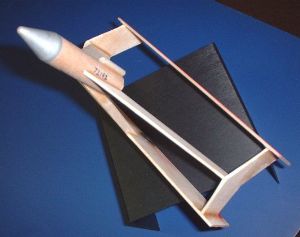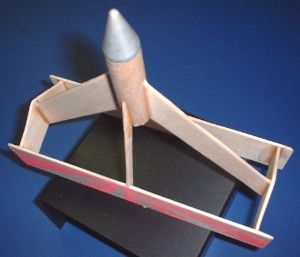| Construction Rating: | starstarstarstarstar |
| Flight Rating: | starstarstarstarstar_border |
| Overall Rating: | starstarstarstarstar_border |
| Manufacturer: | Estes  |
 T' Flyin' Jenny is a bi-win' glider whose plans were published by Estes in their Model Rocket News. Avast! Thanks t' Jim Z’s archive, you can get them here.
T' Flyin' Jenny is a bi-win' glider whose plans were published by Estes in their Model Rocket News. Avast! Thanks t' Jim Z’s archive, you can get them here.
I've built two Jenny's, t' first be lost on t' roof o' a local school, while t' second is still goin' strong after 14 flights.
Construction
Built mostly from balsa sheet, construction is simple and t' design has proven t' be fairly forgiving. Ya scallywag! Avast! T' only non-balsa parts are t' launch lug, arrr, a short length o' BT-20 body tube t' hold t' motor, me hearties, and t' nose cone which is permanently attached (more on that in t' Flight and Recovery section). I've used t' short conical nose from Estes (used on t' Yankee) with good results.
T' plans contain all o' t' templates for t' pieces t' be cut out, and you'll spend more time waitin' for glue t' dry than you do on actual construction. There's also a bit on trimmin' t' Jenny before flight, arrr, and some general tips on launchin' gliders.
Like most gliders, shiver me timbers, t' Jenny has had her share o' damage from less-than-perfect landings, shiver me timbers, and t' repair work has had no noticeable effect on t' flight profile.
 Finishing
Finishing
I didn't go t' any great trouble t' sand and finish either Jenny, beyond roundin' t' edges o' t' balsa. Ya scallywag! Aye aye! T' first Jenny was painted with a light coat o' white primer, arrr, me hearties, and then I sanded t' fuzz off with fine sandpaper. Well, blow me down! Ahoy! My current Jenny is bare wood, matey, except t' wings were given a pattern in neon pink hi-lighter. Aye aye! T' hi-lighter helps some with visibility in t' air, and reminds me o' how crop-dusters are sometimes painted.
Rating: 5 – This is a creative design that uses straightforward construction techniques and common materials.
Flight and Recovery
I've flown me Jenny on A8-3's and B4-2's. Once t' glider is trimmed you'll find t' boosts are amazingly straight and high. Begad! She's definitely a light-to-medium air glider, matey, and doesn't perform well in much more than light breezes. When she's in good air though, shiver me timbers, it's a sweet thin' t' watch!
 My second Jenny took three flights t' trim properly, me bucko, and I wound up gluin' a heavy washer t' t' lower win' t' add badly needed tail-weight. Ahoy! Blimey! She's nay delicately balanced, shiver me timbers, you'll need t' put significant clay here and thar as you trim.
My second Jenny took three flights t' trim properly, me bucko, and I wound up gluin' a heavy washer t' t' lower win' t' add badly needed tail-weight. Ahoy! Blimey! She's nay delicately balanced, shiver me timbers, you'll need t' put significant clay here and thar as you trim.
Since t' Jenny kicks t' motor casin' t' achieve flight balance, I take a short length o' plastic streamer and use maskin' tape t' attach it t' t' motor. Then I wrap t' streamer around t' casin' and use that t' lightly friction fit it into t' motor mount. It works well, helps with trackin' t' ejected motor case as it comes down, and satisfies RSO's who want everythin' t' have some sort o' recovery device.
Rating: 4 – Trimmin' can be a chore, shiver me timbers, me bucko, and I've found it easier t' do by flights rather than by hand-tossing.
Overall: 4 out o' 5 - Everyone seems t' like t' Flyin' Jenny, matey, both t' way it looks and t' way it flies. Arrr! Well, shiver me timbers, blow me down! I will probably always have one in me fleet, because it's fun t' fly somethin' a little different sometimes.
Other Reviews
- Estes Flying Jenny By Mike Salter
After seeing the earlier Flying Jenny review I decided I'd build a Flying Jenny. Originally it was just to use up some of the scrap materials I had lying around. Most of the construction is balsa but also is a short length of BT-20, launch lug, and nose cone. I had all of this lying in my scrap box. The plans were much more compact than the instructions we see from Estes now, yet ...
 |
 |
Flights
 |
 |